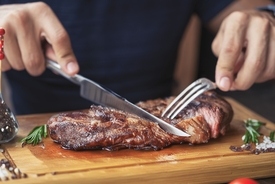If, like the majority of people, you have attempted to shift some pounds at some point, it's more than likely that you were told to cut out carbs. On average, we're told roughly 1,000,000,000,000,000 times a day that carbs are bad for us. A quick swipe on social media and you'll be inundated with bloggers, vloggers and influencers who all preach the gospel about cutting out the carbs and 'going keto.'
But, while the results we see on Instagram are undoubtedly impressive, a new study suggests that cutting out carbs might not be the key to success.
The research, published in Cell Metabolism, comes from The University of Aberdeen and the Chinese Academy of Sciences and revealed that mice who ate high-fat diets gained more weight over a three-month period than mice who ate high-carbohydrate diets.
Even more surprisingly, however, the study found that the mice on high-carbohydrate diets did not gain any weight at all. Because of this, the research concluded that eating fat was the only thing that made the mice gain weight.
The research lasted for three months - or nine mice years - and was conducted by John Speakman. Speakman and his band of lab nerds studied how the mice responded to 30 different diets, which varied in their fat and carb content. The food was also readily available to the animals, meaning that they could eat whenever they wanted.
The results showed that the mice put on "50-60 per cent fats" diet were the heaviest. The research goes against common theories that suggest fats keep you satiated and Speakman suggests that the high-fat diet triggered the mice to consume more calories.
That said, however, the researchers also noticed that mice put on a diet that consisted of 80 percent fat gained less weight and weighed 15 percent less than the mice who were put on the diet that contained 50-60 percent fat. Speakman isn't entirely sure why this is, but it does adhere to the idea that keeping to an extremely high-fat, low carb diet can lead to greater weight loss than moderately high-fat, low-carb diets.
Naturally, humans are much different from mice, making it hard to know exactly how this study will impact the way we diet. Because the study was performed on mice, it's possible that there are no ramifications on humans at all: "It’s often really difficult to translate mice studies to humans," Spaniolas tells MensHealth.com.
That said, Spaniolas does admit that he is surprised by the fact that mice on a high-carbohydrate diet did not gain any weight at all. "A high-carbohydrate diet is not a recommendation for weight loss," he says.
Despite the findings of the results, Spaniolas still asserts that "there is no question that ketosis does work in the short term" for humans, and says that there is plenty of data to support that. While the research doesn't pour water on the keto-diet hype train, it does show that carbs may not be the be all and end all when it comes to weight gain.

